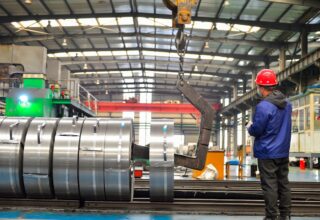
Suppliers impacted by the JLR cyber-attack are being given urgent financial advice and support from the Investment Readiness Programme.
Delivered by Oxford Innovation Advice and funded by the West Midlands Combined Authority (WMCA), the initiative was originally designed to help firms explore the local funding landscape, understand their cashflow issues and access appropriate finance to suit their needs.
Recent events at JLR mean that some firms are tapping into this support to offset some of the short and medium-term pain caused by the car maker halting production for several weeks.
The ‘Future Fit Cohort’ is a means of getting crucial information to tier 1, 2 and 3 suppliers, with a series of events planned for bosses trying to navigate the maze of available support packages in place, whilst also giving them external advice on business planning and raising investment.
This critical assistance has already helped the management team of one pressings manufacturer gain the option of a £150,000 loan facility if they need it to bridge the gap until production resumes.
Sharn Hayward-Higgs, one of the specialists in the Investment Readiness team, commented: “The impact on the West Midlands supply chain has been huge and we’re hearing daily about finance issues, potential redundancies and, in the worst possible cases, companies going under.
“These are sound businesses, who have been victim of criminal activity that few could have anticipated. They deserve the best possible chance to survive and hopefully recover and that’s what we’re trying to do through our ‘Future Fit Cohort’.”
She continued: “We’ve got several experts on hand to help suppliers understand how the Government loan guarantee scheme works and assist them on how they can get access to funds as quickly as possible. There is a series of events they can attend, including a Meet the Funders event due to be held next week (October 15th).”
The first three ‘Future Fit Cohort’ sessions have covered decarbonisation and diversification, the digital skills transformation and Made Smarter talking about automation to improve manufacturing productivity.
AI was also on the menu at the same event, with SWAI Ltd and Garfield AI showcasing their software that acts as a marketing partner to firms targeting new sectors and a programme that helps SMEs claim back unpaid invoices respectively.
“Next week’s seminar is our most heavily subscribed yet,” added Sharn. “We’ll have presentations from Barclays, ART Business Loans, Frontier Development Capital and Midven covering the Co-Investment Fund. There will also be Forvis Mazars on hand to go through ways to maximise planning and building investment cases.
“Places are still available for this event, and we’d love to get more JLR suppliers on board.”
A recent Investment Readiness survey showed that the majority of manufacturers in the West Midlands are looking for investment of between £50,000 and £250,000 over the next two years.
The main things this money will be spent on is new machinery, automation and energy efficiency, along with plans for expansion, training and exports.
Sharn continued: “When it comes to support, businesses are very clear: they want help with finding and applying for grants and finance, building solid business plans and financial forecasts, and understanding tax reliefs like R&D.
“The biggest challenges holding them back are the high upfront costs, economic uncertainty, and not knowing what funding is available or how to access it. We designed the ‘Future Fit Cohort’ around these key findings and the JLR cyber-attack has exacerbated the need for it.”
Suppliers wanting immediate advice and support should contact https://www.investment-readiness.co.uk/contact/














